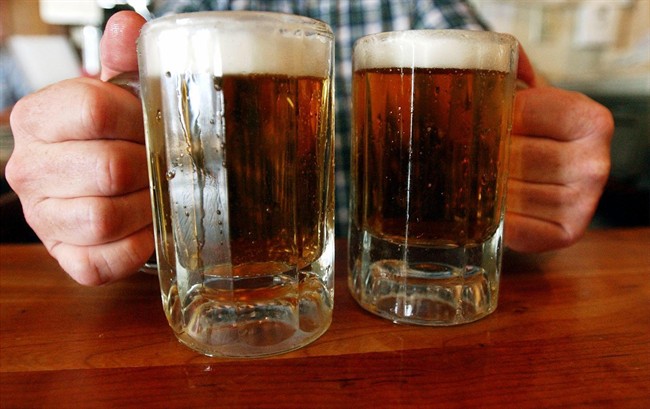TORONTO — Not a litre of water nor that late night grease-fest can save you from a hangover after a night of heavy drinking, according to a new study on excessive alcohol consumption.

The findings will be a downer for anyone who likes to partake in a few too many drinks: only less drinking is guaranteed to subdue the next-morning pain.
More than 1,500 students in the Netherlands and Canada were surveyed for the study.
The students in Canada, 789 in total from Acadia University in Wolfville, N.S., were surveyed about their heaviest drinking occasion in the past month: number of drinks consumed, the timeframe of consumption, and how hard their hangover hit the next day.
Using that data researchers estimated the students’ blood alcohol concentration (BAC) for those who reported experiencing hangovers and those who didn’t. About four-fifths, 79 per cent, of people who reported not getting hangovers had an estimated BAC of less than 0.10 per cent, suggesting they likely didn’t drink enough to get a hangover.
READ MORE: Alcohol without the hangover? This scientist is testing booze without the nasty side effects
To reach a BAC of 0.10, a 180 pound male would need to consume seven drinks over fours hours. A 145 pound woman would have a BAC of just over 0.10 after five drinks in four hours, according to MADD Canada.
- Naloxone-resistant street drug linked to 9 deaths in Eastern Canada seized in Alberta
- ‘She gets to be 10’: Ontario child’s heart donated to girl the same age
- Buzz kill? Gen Z less interested in coffee than older Canadians, survey shows
- Bird flu risk to humans an ‘enormous concern,’ WHO says. Here’s what to know
“In general, we found a pretty straight relationship; the more you drink, the more likely you are to get a hangover,” said lead author Dr. Joris Verster from Utrecht University in the Netherlands. “The majority of those who in fact reported never having a hangover tended to drink less, perhaps less than they themselves thought would lead to a hangover.”
The study found that for those with a BAC of 0.20 or more, “almost nobody showed to be hangover immune.”
Researchers said the 25 to 30 per cent of respondents who said they don’t get hangovers are more likely to continue drinking, “so good research into the outcomes of drinking to excess is needed.”
The researchers then refined the study to look at the effects of food and water on hangovers: 826 Dutch students were asked about their most recent heavy drinking session and what they consumed after the alcohol. They were then asked to rate the severity of their hangovers the next day. While 54 per cent responded they had eaten, the hangover severity between those who had and those who hadn’t was slight.
Those who tried eating a large breakfast or fatty food to kill the hangover the next day also showed only a light improvement in severity.
The difference between those who reported drinking water while consuming alcohol and before bed versus those who reported no efforts to hydrate was “modest”.
READ MORE: Does heavy drinking tamper with your immune system? Here’s what happens
“Those who took food or water showed a slight statistical improvement in how they felt over those who didn’t, but this didn’t really translate into a meaningful difference,” said Verster.
“From what we know from the surveys so far, the only practical way to avoid a hangover is to drink less alcohol.”
Joris acknowledged the questionnaire-based study has limitations, but offers an indication for drinking habits and outcomes. The next step would be a controlled trial.
The research was presented recently at the European College of Neuropsychopharmacology (ECNP) conference in Amsterdam.
If you are still a believer in finding the magic cure for a hangover, you can always try these dietitian-recommended tips.


Comments